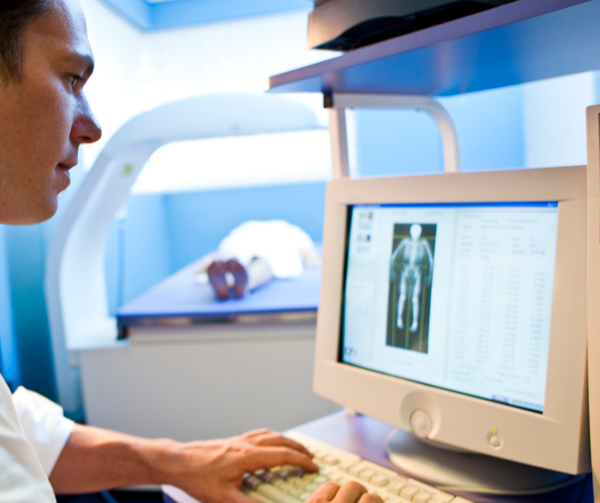Osteoporosis is a bone condition that affects 1.36 million Australians.
Early diagnosis is important. A bone density scan is quick, painless and you could be eligible for a Medicare rebate.
Common risk factors for Osteoporosis
Family history
Poor bone health can be heredity. Check if anyone in your family (particularly parents or siblings) have ever been diagnosed with osteoporosis. This includes parents or siblings who have experienced a broken bone (from a minor fall) or rapidly lost height, as this can indicate being at risk of osteoporosis.
Calcium and vitamin D
Low calcium intake: Adults require 1,000 mg per day (preferably through diet) increasing to 1,300 mg per day for women over 50 and men over 70 years.
Low vitamin D levels: Vitamin D is needed to absorb calcium. Lack of sun exposure can lead to low vitamin D levels. People at risk of vitamin D deficiency should be investigated.
Medical history
Conditions and medications which can impact bone health:
- Breaking a bone from a minor bump or fall should be investigated in anyone 50 years +
- Low hormone levels – early menopause in women or low testosterone in men
- Coeliac disease, inflammatory bowel disease and other malabsorption disorders
- Diabetes
- Certain breast cancer treatment or prostate cancer
- Anorexia nervosa
- Corticosteroids – commonly used for asthma, rheumatoid arthritis or other inflammatory conditions
- Thyroid conditions – overactive thyroid or parathyroid
- Rheumatoid arthritis
- Chronic liver or kidney disease
- Certain epilepsy, antidepressant or HIV treatment
Lifestyle factors
- Low levels of physical activity
- Smoking
- Excessive alcohol intake
Body build and weight
- Thin body build can increase your risk
- Obesity, studies suggest hormone changes associated with obesity can impact bones
How is osteoporosis diagnosed?
Osteoporosis is diagnosed with a bone density scan (also referred to as bone density test, bone mineral densitometry, BMD or DXA scan). It is a simple scan that measures the density of your bones at the hip and spine. You simply lie on a flat padded table and the arm of the machine passes over your body. The scan takes approximately 10-15 minutes and we’ll send the results from the test to your doctor.
Do I need a referral for a bone density scan?
Your GP or specialist will provide a referral for your bone density scan after assessing your risk factors for osteoporosis.
Where can I have a bone density scan?
At Lime Radiology - We perform bone density scans Monday to Friday.
Who should have a bone density scan?
Women and men over 50 with risk factors for osteoporosis need a bone check up with a bone density scan. Younger adults with risk factors may also require a test as determined by their doctor.
What will the scan tell me?
A bone density scan will determine if any action is needed to protect your bone health. The result will commonly refer to a ‘T-score’ and indicate if your bones are in the range of either:
- Normal
- Low bone density (called osteopenia) or
- Osteoporosis
If your bone health is normal then maintaining adequate calcium, vitamin D and exercise remains important. If the result shows osteopenia or osteoporosis it is essential action is taken to protect your bones. Improvements in bone density and your bone health can be achieved over time.
T-score |
Diagnosis |
What does this mean? |
Action required |
|
-1 to -2.5 |
Osteopenia |
This means you have lower than normal bone density. Action may be taken to protect your bone health depending on your age, the level of bone density and any risk factors for osteoporosis. The approach will be different if a fracture is present. |
Your referring doctor will aim to reduce further bone loss, monitor your bone health with a follow up scan (1 – 5 years) and ensure adequate calcium, vitamin D and exercise. Your doctor will review any other health conditions or medications which can impact your bone health. If a fracture has occurred your doctor will commonly start treatment to reduce the risk of more fractures. |
|
-2.5 or lower |
Osteoporosis |
Diagnosed osteoporosis requires immediate action as fracture risk is high. |
Your referring doctor will commonly commence osteoporosis treatment to protect your bone health and reduce the risk of a first fracture (or further fractures if one has occurred). Your bone health will be monitored with regular scans (every 1 – 2 years). Your doctor will ensure adequate calcium, vitamin D and exercise together with your osteoporosis treatment. |
Cost
If you are eligible for a Medicare rebate, the cost for a bone density is $15.
A Medicare rebate for a bone density scan applies for:
- People with diagnosed osteoporosis
- Anyone with one or more previous fractures from a minor incident
- Corticosteroids use (common for asthma)
- Women with early menopause
- Men with low testosterone
- Individuals with coeliac disease (or other malabsorption conditions), overactive thyroid or parathyroid conditions, rheumatoid arthritis, liver or kidney disease
- those aged 70 years or over
Patients with other risk factors can pay directly for a bone density scan. At Lime Radiology, our charge is $100, or $85 for concession card holders, if you do not meet the Medicare criteria for bulk billing.
Please note: Other types of bone tests available in some pharmacies or shopping centres are not the recommended standard test to measure bone strength.

